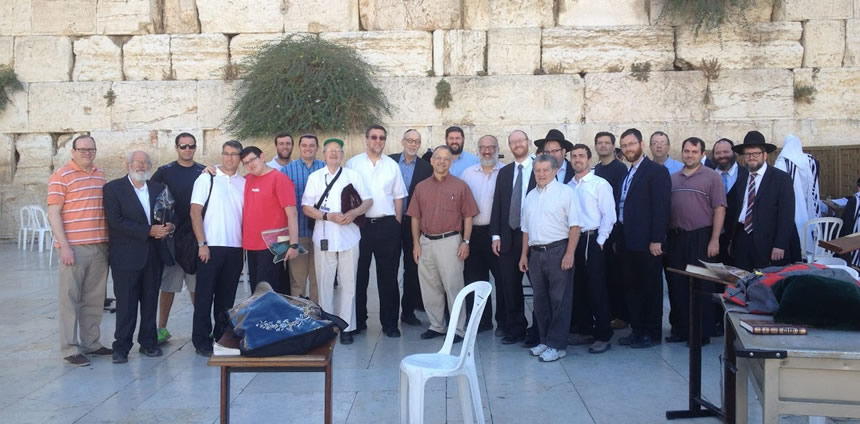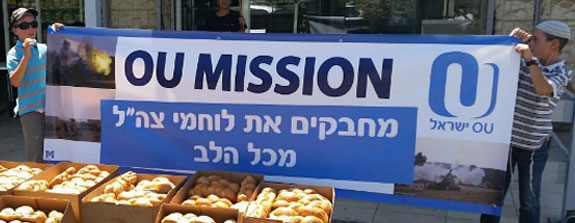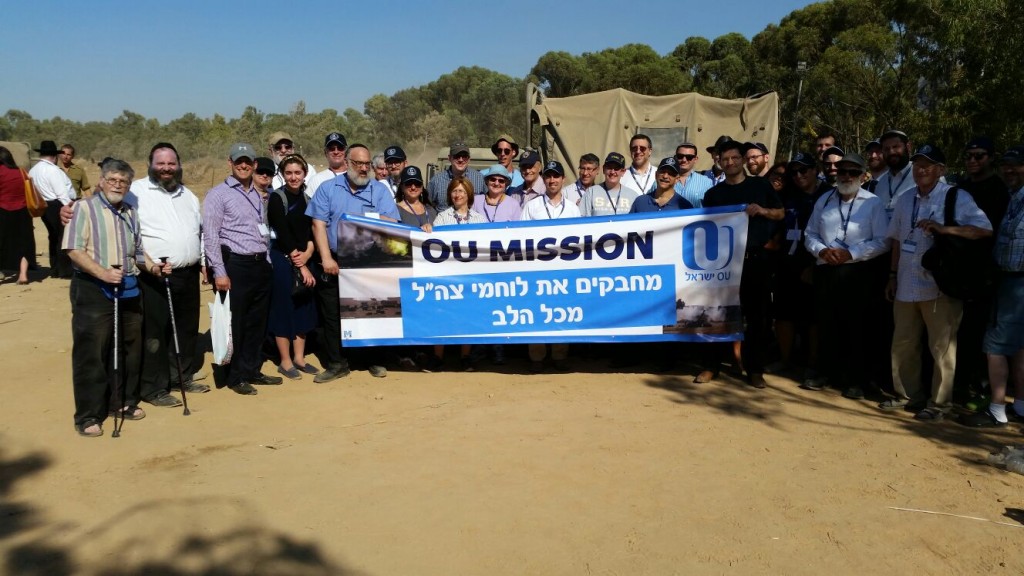The Orthodox Union’s Solidarity Mission to Israel, led by Rabbi Tzvi Hersh Weinreb and Rabbi Steven Weil, was well received at the many different visits they made. Below you’ll find reports from the mission, including video and written recaps of the inspiring journey.

Video clips from the OU Solidarity Mission to Israel:
Rabbi Weil addresses the group:
The mission visits Soroka Hospital in Be’er Sheva:
At the Ben and Jerry’s factory:
Sunday, July 27 pm:
DIMONA — The Israel That People Don’t Think About
JG, a friendly woman in her 50s who lives in a poor section of the Israeli city of Dimona (famous for its nuclear facilities), told me this afternoon how, six and half years ago, her daughter finally decided to divorce her husband: the police arrested him for threatening to burn her alive, along with their five children and JG. Before that he had been drinking and beating her and the kids, as they all lived together in JG’s tiny apartment, mostly sleeping on mats on the floor.
Hodayah and Michelle are 14-year old, giggling buddies. Delighted to pose for a photo with R. Yehudah Oppenheimer of the Young Israel of Forest Hills, NY, they are showing off their handiwork, a dish of henna they smeared on people’s palms as a “segulah” (a folk act to bring good fortune) for finding a good spouse for oneself or one’s children.
Chatting with them, I discovered that they only go to school, “when I feel like it.” After listening to me dutifully as I naively encouraged them to focus on their school work, on finding good jobs, and only then on finding husbands, the truth came out: school is a joke, so why should we go? Kids don’t pay attention to their teachers or the material being taught, preferring instead to chat with one another on their phones. Most kids don’t bother to go.
JG told me that her parents came from Algeria and Tunisia. Other families in the neighborhood are from Russia, India, and Morocco. They are an integral part of the glorious ingathering of our exiles from all parts of the world to our homeland, yet they are at the lowest socioeconomic rungs of society. Poor, often unemployed, facing varied familial woes, sometimes disabled, poorly educated, and living in unattractive surroundings, their future is without joy or hope. Many families are sustained by government programs, and have no able-bodied working adults in the home. Fathers — like JG’s former son-on-law and her own husband whom she divorced — are often absent or deadbeats, leaving behind overwhelmed mothers trying to care for themselves and their children, alone.
The Orthodox Union’s Israel division identified this community and others like it around the country in order to try to break this cycle of poverty and hopelessness. The first focus was on the youth: to give them hope and good role models, and to keep them away from crime, the streets, and their depravities. OU workers and volunteers in Dimona cleaned out a formerly filthy bomb shelter (picture) in the middle of the housing development (picture). Then, they stocked it with fun and food, and staffed it with idealistic young men and women, many of whom have moved into the neighborhood to integrate themselves into its daily life.
As OU staffer Chaim Pelzner (pictured here) told me, they soon discovered that this humble youth center transformed not just the kids, but also served as a magnet for many of the neighborhood’s adults.
Wholesome hope, old-fashioned caring, and abundant ahavat Yisrael (love for fellow Jews) attract and affect everyone in the entire neighborhood, young and old alike.
And so, delivering toys, games, and tasty treats this afternoon to this superb project was personally gratifying. It was delightful to see the obvious joy on the faces of young and old, for whom hanging out (and — in these days of missiles — sleeping) in a suffocating bomb shelter is a dramatic and profusely appreciated improvement in their living conditions. Our Sages’ teaching In Pirkei Avot (Ethics of the Fathers) that while, “you need not complete the work, neither can you desist from it,” allowed for a sense of modest accomplishment, even while realizing how pitiful, in the end, such contributions are.
For it is indeed obvious that addressing such complex societal problems requires the joint efforts of many parties: government programs, good schools, personal commitments, Divine grace, and more. Private charitable initiatives — such as the OU’s efforts in Dimona and elsewhere around Israel — are a critical part of these comprehensive efforts, as well.
As Religious Zionists, we are committed to building a holy, righteous society which partners with God in all the above ways to bring our Torah’s holy vision to fruition in our holy homeland, Israel. Specifically, I believe that all these activities are the practical fulfillment of the vision implicit in a pair of blessings we recite, one after the other, three times each day in the Amidah. First, we pray for the ingathering of our exiles: “Blessed are You, Hashem, who gathers in the scattered members of His people.” Thank God, the half of world Jewry who are privileged to be Israeli citizens — in Dimona and throughout the Land! — represent millions of fulfillments of this prayer.
But immediately thereafter, we bless God again, requesting that He help us to create a just society in Israel for those very ingathered Jews: “Blessed are You, Hashem, who Loves Righteousness (Charity) and Justice.” Although this work is certainly not only ours to complete, let each of us make sure that we are truly doing our part.
Sunday, July 27 AM:
At Soroka Medical Center in Beer Sheva, our OU Mission group visited more injured soldiers. One was Devir Avraham (ben Rachel) Diamond, who made aliyah with family from the United States. He is married to a lovely woman; he dandled their adorable 1-yr old daughter on his lap. Devur served in Gaza until last Saturday night, when Hamas fighters emerged from a nearby tunnel. He killed them, but one of his bullets hit his target’s suicide belt which exploded, injuring his right eye. He asked not to be photographed, but that people should pray for his recovery.
The video shows the incredible patriotic spirit of Israelis. A man named Eli Israeli and his wife spontaneously started praying, singing, and dancing to “Am Yisrael Chai” (“the Jewish people lives!”) in the hospital lobby, drawing others into their circle and astonishing the hospital staff.
Soroka has admitted 450 wounded soldiers in this war so far. It is a 7-10 minute helicopter flight from Gaza, but it is often hard to find area to land in Gaza which is safe from Hamas missles. Every family and soldier receives psychological and social work care for trauma.
Founded as community hospital with 230 beds in 1959, Soroka now has 1337 beds, and has all medical specialties and subspecialties. It serves as a tertiary care center for 1.2 million people, about 15% of Israel’s population, and covering 60% of Israel’s land area, extending to Eilat in the south and including a huge Beduoin population.
Soroka prepared in advance for the war since some its facilities are not protected from missles. It moved 24 1-lb preemies from its NICU, with 8 staff/baby. It closed down non-protected operating rooms, CAT machines and other equipment. Shifts increased to 12 hour shifts. Built protected camp area for staff’s children so parents can work at hospital. During Operations Lead Cast and then Amud Anan, increased direct and indirect costs to Soroka were 30,000,000 shekels. In the first, the government provided some compensation; for Amud Anan Expenses are higher during war and income resources are lessened due to closed facilities; no sources of funding are available to protect the rest of the hospital.
Motzei Shabbat, Saturday, July 26:
From Rabbi Steven Weil:
Friday – We met with one of the engineering groups that is demolishing the tunnels. The leader of the brigade said it takes 3-4 days under optimal conditions to destroy a tunnel with multiple openings.
We met with the Sayeret Golani brigade that lost seven soldiers to a RPG attack last Sunday, in a Black Hawk Down type of battle, trying to evacuate their peers. We saw the backpacks of the seven, which their peers guarded as kodesh kodashim. As well as the standard supplies, we brought them multiple generators, which they had requested of Rabbi Berman.
Friday night in Sderot — the most meaningful Friday night davening that I ever had. Over 500 officers, soldiers and members of counterintelligence units davened, slept and ate at the Yeshivat Hesder Sderot. To see guys davening for the first Friday night of their life and dressed in all types of gear. They were welcomed not only by the yeshiva but by all of Sderot with open arms. They trained in urban warfare on construction sites of apartment buildings. We talked for hours with counterintelligence soldiers and officers of combat units. The morale is extremely high and Hamas is starting to buckle. Israeli soldiers were leaving hospitals without permission to get back to their comrades in Gaza. The IDF had to put guards at the hospitals to prevent this. There is an extremely united sense of purpose. There still is resistance but many Hamas posts have been abandoned and the resistance is significantly less. The tunnel network is extensive but they are finding more and more. Before the ceasefire on Shabbos morning, Israel was bombing Beit Hanoun and Khan Yunis all Friday night. The sound of cannon fire, F-16s and other Israeli weapons didn’t stop all night. You couldn’t sleep; needless to say, war isn’t the way it’s portrayed in the movies. We were about a kilometer from the border so we were watching buildings that had explosives in them explode, and burst out in black smoke that filled the sky.
For 2000 years we have only been on the receiving end of implements of war and in our lifetime we have been blessed with the means of being able to defend ourselves, and not have to be slaughtered, but can respond with force.
I had lunch with the new mayor of Sderot and his family in their home. He is a former executive of the Hesder Yeshiva and facilitated the OU expansion in town. He is a capable leader who has found many funding partners for municipal projects. We counted six cranes from the view out of our dormitory room and he shared that 3000 apartments and condos are under construction. There are jobs in Ashdod, Ashkelon, and Be’er Sheva, all within a 30 minute commute, and Tel Aviv is only 50 minutes with the high speed train. They set up funds to subsidize university education for residents. They are grateful for the country’s response.
Tomorrow we go on hospital and shiva visits as well as meeting with CEOs whose companies have been profitable and functioning under continuous rocket fire.
There is a real sense of purpose and unity in the country.
I could go on, but the city, the soldiers and the combat unit saw that the Jewish world cares and is behind them. They were really grateful, though not as grateful as we are to them.
Friday, July 25, 3:35pm Israel time:
We are now driving to Sderot, with planned visits today to IDF soldiers and to an Iron Dome installation. (Thank you, America!) However, the area is presently closed off by the IDF due to security concerns, so there is some uncertainty about our exact route.
As we travel, OU’s Rabbi Steven Weil told us about two conversations he had on our El Al flight from JFK to Ben Gurion airport. The first was with former chief of staff for Benjamin Netanyahu, Yechiel Leiter; the second, with R. Dr. Jeffrey Woolf, student of R. Joseph Soloveitchik and Jewish professor at Bar Ilan University.

Separately, each emphasized the same point: that since at least the late 1970s (more than 40 years ago!), there has not been this degree of political and brotherly unity among Israelis of all stripes. It began with national devotion to the three boys who were killed, and continues to this day. Hamas rockets threaten millions of Israelis wiithout distinguishing between right and left, degree of religiosity, or any other factor. The resulting political support from across the entire Israeli political spectrum for this operation distinguishes it from previous, more contentious undertakings which deepened existing divisions in Israeli society.
R. Avi Berman (OU Israel told several moving stories about this outpouring of bravery, heroism, love and unity from all sectors of Israeli society towards one another and IDF soldiers. One story: an injured soldier in the hospital saw someone wearing a T-shirt saying ‘Sderot’. The soldier called him over and said: “I took that grenade because I love you guys so much.”
Friday, July 25:
Photo taken by Rabbi Avi Berman, Executive Director OU Israel:

Thursday, July 24, 6:00pm NYC time:
I’m leaving on a jet plane with R. Steven A. Weil on @OrthodoxUnion support mission of about 50 people to Israel. Barring technical problems, I’ll be posting on behalf of OU about our trip’s progress in Sderot and elsewhere, comforting bereaved families, visiting injured soldiers, bringing smiles to children, and more. Stay tuned!
Support the OU’s efforts in Israel – donate to the OU Israel Emergency Fund.
The words of this author reflect his/her own opinions and do not necessarily represent the official position of the Orthodox Union.